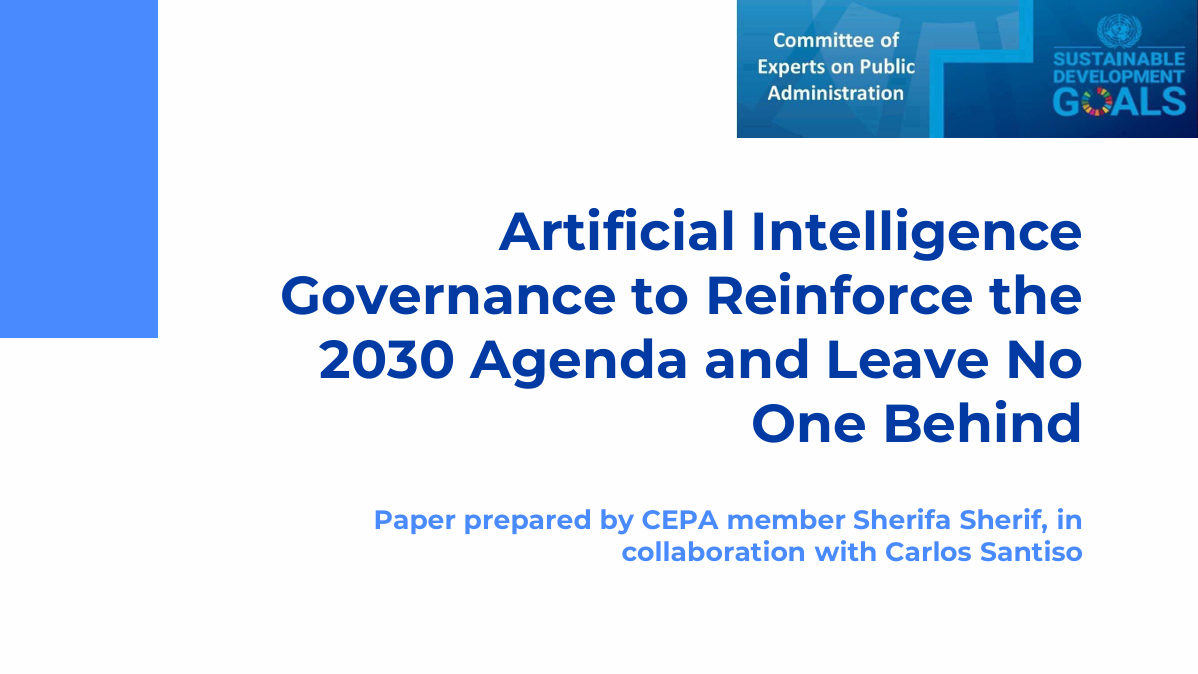The document explores the essential role of AI governance in achieving the Sustainable Development Goals (SDGs) and equal AI benefits. It highlights AI’s potential to enhance economic growth, foster innovation, and address global challenges. The report also underscores the need for ethical considerations and regulatory compliance for responsible AI use, particularly in law enforcement and social services.
Global cooperation is emphasized in maximizing AI benefits and minimizing risks. In 2023, the UN established an AI Advisory Body to supervise international AI governance. Its interim report provides suggestions on inclusive AI governance, vital for leveraging AI for the SDGs. After extensive stakeholder discussions, a final report is expected before the Future Summit.
It estimates that in 2030, AI could contribute up to $15.7 trillion globally, including a potential $1.2 trillion boost for Africa. This projection underscores the importance of active participation in the UN’s sustainability agenda to ensure AI helps tackle complex problems and achieve the SDGs.
Overview
Definition & evolution of artificial intelligence
Examines the concept and development of AI. It defines AI as the capacity of machines to mimic intelligent human behavior through tasks such as sensing, reasoning, learning, and decision-making. The evolution of AI is discussed, from traditional rule-based approaches to modern generative AI powered by machine learning techniques.
As emphasized in this section, AI aims to enable computers to think and act like humans, showcasing the shift from rule-based to data-driven AI models. The role of algorithms in replicating human brain functions and the significance of AI in propelling technological advancements are also mentioned.
Potential of artificial intelligence for accelerating SDG implementation
Explores how AI can accelerate the achievement of Sustainable Development Goals (SDGs). It underscores AI’s potential in identifying vulnerable populations, monitoring poverty, enhancing basic services, supporting agricultural and financial growth, and promoting personalized learning.
Furthermore, AI can encourage inclusion, bridge knowledge disparities, stimulate the economy, increase productivity, generate jobs, inspire innovation, handle infrastructure, improve manufacturing, forecast climate change, advance urban planning, and endorse carbon neutrality. The transformative potential of AI in tackling challenges and propelling SDG progress is emphasized.
Risks & challenges of artificial intelligence
Overdependence on Technology
- There is a concern that over-reliance on artificial intelligence could reduce human interaction, critical thinking, and essential soft skills, potentially resulting in a loss of creativity, social skills, and empathy. Technical difficulties and glitches in AI systems could disrupt education, learning, and productivity.
Job Displacement
- According to the World Economic Forum’s 2023 report, artificial intelligence could eliminate 85 million jobs by 2025, potentially deepening workforce disparities and global inequalities. Reskilling and combating digital illiteracy are identified as critical needs.
Lack of Skills
- IBM estimates that around 40% of workers globally will need to reskill over the next three years to adapt to the changing landscape driven by artificial intelligence. Addressing digital illiteracy and ensuring access to necessary skills are critical challenges.
Loss of Traditional Industries
- Artificial intelligence could lead to the automation of traditional industries in developing countries, potentially causing economic instability for economies reliant on these sectors.
Lack of quality data
- Poor quality data can negatively impact AI systems, leading to inaccurate outcomes, increased bias, and potential discrimination. Therefore, it’s crucial to base AI algorithms on reliable, accurate, and representative data for fair and unbiased applications.
Economic Disparities & Equity Issues
- The lack of access to AI technologies in developing countries may widen inequalities between nations. Countries with advanced AI capabilities may experience accelerated growth, disadvantaging developing nations.
Moral & Ethical Issues
- AI systems may exhibit biases, particularly in racial profiling, leading to unfair treatment of individuals. This can result in the denial of access to healthcare and loans or the misidentification of criminal suspects by law enforcement.
Misinformation & Manipulation
- AI-generated content, such as deep fakes, spreads false information and manipulates public opinion, challenging societal trust and information integrity.
Privacy Issues & Security Risks
- Concerns arise regarding data control in AI systems, potential data monopolies, and data misuse. Lack of transparency in AI decision-making processes can lead to distrust and hinder effective oversight.
Lack of Transparency
- AI systems’ opacity can hinder technology adoption due to distrust. People may be skeptical if they can’t understand how AI makes decisions. This “black box” effect complicates oversight, accountability, trust, and ethical assurance.
Artificial intelligence governance to ensure sustainable development and leave no one behind
Highlights the need for proactive AI measures to balance benefits with potential risks. It focuses on AI governance for sustainable development, societal challenge resolution, and equal AI benefits distribution while reducing risks and disparities.
- Global cooperation and strategic foresight are needed to ensure the equitable distribution of AI benefits and address potential negative externalities.
- Effective governance is important to closing the gap between accountability, transparency, ethics, and integrity in technological advancement.
- Ongoing efforts by governments, the UN system, and stakeholders to regulate AI in alignment with shared global values and the 2030 Agenda, with a focus on leaving no one behind.
- Recommendations include continuing global dialogue, adopting a Global Digital Compact, and using evidence-based policymaking to regulate AI responsibly and promote inclusive development.
Conclusion & Recommendations
- Urgent Need for Global Cooperation: There is a pressing need for global cooperation, strategic foresight, and a steadfast commitment to ensuring the fair distribution of AI benefits while addressing potential negative impacts.
- Closing the Accountability Gap: AI governance should aim to bridge the accountability, transparency, ethics, and integrity gaps in technological advancements to ensure responsible AI development and deployment.
- Continued Efforts and Global Dialogue: Governments, the UN system, and other stakeholders are encouraged to continue their efforts, including the potential adoption of a Global Digital Compact at the Summit of the Future 2024, to regulate AI in alignment with shared global values and the 2030 Agenda.
- Promoting Inclusive Development: It is essential to foster a global dialogue, build an evidence base for AI regulation, and ensure that AI contributes to achieving the 2030 Agenda while leaving no one behind.
Moreover. However. Nevertheless. Nonetheless. Furthermore. Hence. Moreover. However. Nevertheless. Nonetheless. Furthermore. Hence.




